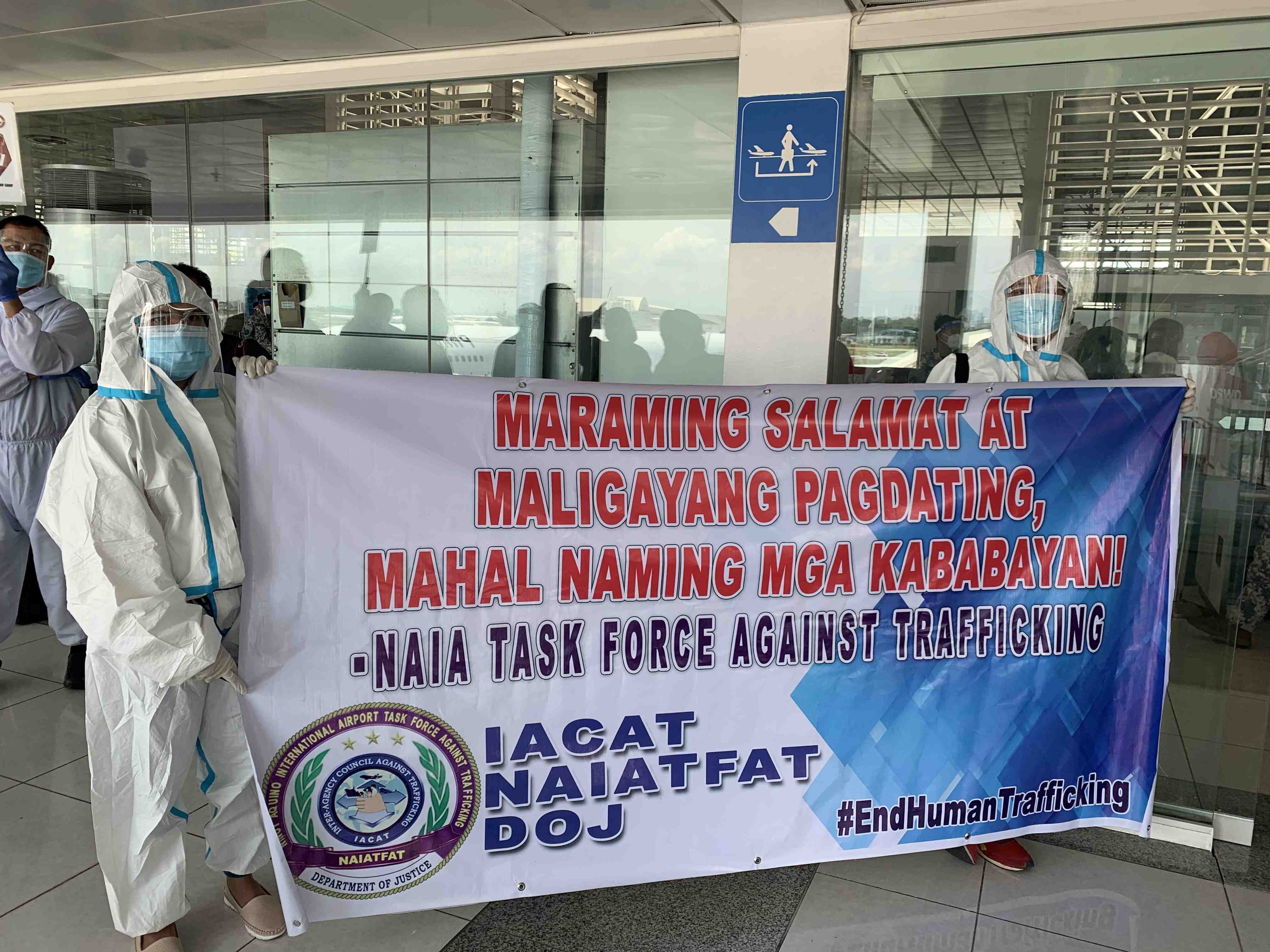The long journey home for OFWs in Lebanon
As the sun set over Beirut, 317 Filipinos—domestic helpers, chefs, chocolate factory workers and nurses, among others— boarded a PAL flight chartered by the Department of Foreign Affairs to repatriate the distressed OFWs.
BEIRUT—There are no more dollars in Lebanon, at least for now; the economy is in shambles: the security situation is precarious; police and military men with long rifles are everywhere; COVID-19 cases have hit record highs; a towering inferno gutted parts of the capital and who knows when another deadly explosion will rip through this port city.
These are enough reasons for Filipinos here to want to go back to the Philippines and some of them did just that last Friday (Sept. 25), packing their lives in suitcases of varied shapes and sizes, and bringing with them giant red teddy bears and other toys for their young ones back home.
They couldn’t wait to go home. Although an uncertain life awaits them in the Philippines, they believe home still the better option.

Returning OFWs send-off meeting at the Phillippine Embassy in Beirut. Photo courtesy of Presidential Communications Operations Office

Photos by Iris Gonzales
As the sun set over the city, 317 Filipinos—domestic helpers, chefs, chocolate factory workers and nurses, among others— boarded Philippine Airlines flight PR8681, chartered by the Department of Foreign Affairs, to repatriate the distressed OFWs.
The setting sun was a perfect metaphor to the end of their years of toiling in this country, touted as the land of milk and honey because of the milk from its snow-covered mountain peaks and honey from fragrant woods.
There are 34,000 OFWs here. For many of them, Lebanon, once touted as Paris of the East, indeed was a place where food was plenty and money was easy; some domestic helpers earned around P20,000 to P35,000 a month, more than double of what they could earn in Manila.
But an economic implosion brought about by decades of corruption and mismanagement have put an end to the good times.

The Lebanese government, its banks and its citizens have run out of foreign currency and the Lebanese pound has lost nearly 80 percent of its value amid hyperinflation and unemployment.
The journey home
I had the opportunity to join the flight, the government’s 50th repatriation flight since February. We left NAIA around 4:30 a.m. on Friday for the 11.5-hour trip to Beirut, arriving at the Aéroport International de Beyrouth at 11:30 a.m., local time the same day.
The repatriated OFWs' journey home commenced at the Philippine Embassy in Beirut in Hadath with a send-off ceremony.
They couldn't wait to go home. Although an uncertain life awaited them, they believed home was still the better option.

‘No more dollars’
Maricel Tagapan, 35, was among the repatriated OFWs. She had worked in Lebanon as a cleaner.
"Wala na’ng dolyar. (There are no more dollars)," she said.
There’s no job waiting for her in the Philippines but she believes she can survive. Most importantly, she would be reunited with her son whom she has not seen for at least 10 years.
Distressed children
Also on the flight was 62-year-old Leah Montealto upon her children’s pleading for her safety.
"Ayaw na ng mga anak ko na manatili ako sa Lebanon. (My children don't want me to stay away in Lebanon anymore)," said Leah, who had spent 16 years in the West Asian country working as a domestic helper.
Life back home is likely to be uncertain, too, but she would take it.

Life is what we make it
Registered nurse Myra Aragon, 48, on the other hand chose to stay in Lebanon where she has been working since 2004. She feels her mission in the country isn't over.
She founded Flicker, a community of Filipinos in Lebanon. The group has 1,200 members and helps OFWs in need of medical or employment services.
“I enjoy helping people,” she said.
“But isn't life here difficult now?” I asked.
“Life is what you make it. You make the best of what you have and, as for me, I enjoy helping,” she said.

The heart of the Filipino
The returning Filipinos were thankful to the Philippine government repatriation team led by Presidential Assistant on Foreign Affairs Robert Eric Borje for making the free trip possible.
They also thanked PAL for bringing them home safely. PAL Captains Rommel Quizon and Raymund Casambre led PR8681 BEY-MNL, with flight purser Jeffrey Briones leading the cabin crew while PAL B777 Chief Pilot, Captain Leo Bernabe and flight purser Levi Villanueva led PR8680 MNL-BEY.
Members of the PAL team—two sets of crew—donned their specially designed royal blue PPEs, with face shields and masks the whole time.
I'm sure it wasn't the most comfortable thing to wear on an 11.5-hour flight but the discomfort did not show. PAL's trademark impeccable and warm service was the same and their smiles showed how they, too, were proud to be part of the historic flight. Truly, the heart of the Filipino was beating at 30,000 feet in the air.

The repatriation flight also carried 5,000 boxes of relief goods and medical supplies from the DFA and LT Group, the listed conglomerate of taipan Lucio Tan, for Filipinos residing in Lebanon. LT Group donated face shields, masks and vitamins.
Props to the country's flag carrier and its indefatigable president, Gilbert Santa Maria for a successful repatriation mission.
Touchdown
A big round of applause reverberated from the cabin as PAL's Boeing-777 touched down on NAIA at 10:39 a.m. on Saturday.
The sun was out in Manila, marking a new dawn for the returning OFWs. From the plane, they will journey toward the rest of their lives. Will they work in other distant shores or return to Beirut someday? Only time will tell. For now, they're simply happy to be home.
* * *
Email the author at eyesgonzales@gmail.com. Follow her on Twitter @eyesgonzales. Column archives at eyesgonzales.com.

